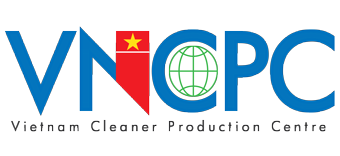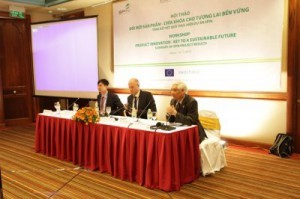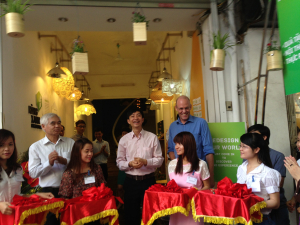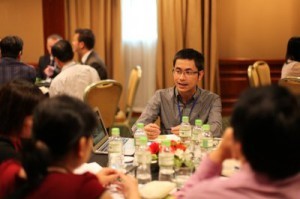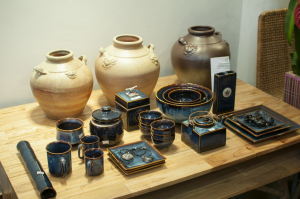Thị trường EU phụ thuộc vào nguồn thủy sản NK để đáp ứng nhu cầu tiêu thụ cá và thủy sản. Năm 2013, khả năng tự cung thủy sản của EU chỉ có thể đáp ứng nhu cầu đủ cho đến ngày 7/7, cho thấy gần một nửa tiêu thụ thủy sản của EU phụ thuộc vào nguồn NK.
Năm 2011, các loài cá NK như cá minh thái Alaska, cá ngừ và cá tra chiếm tới 40,3% tổng lượng tiêu thụ của Đức. Tại Hà Lan, cá ngừ đứng vị trí thứ 2, cá tra đứng vị trí thứ 3 về khối lượng trên thị trường.
Thị trường EU gồm 27 thị trường đơn lẻ với dân số dự kiến tăng thêm 21,3 triệu lên 522,3 triệu người vào năm 2030. Tổ chức Nông lương Liên hợp quốc (FAO) dự đoán tiêu thụ bình quân thủy sản sẽ tăng từ 22 lên 24 kg/người/năm. Do đó, EU vẫn sẽ là thị trường quan trọng cho sản phẩm cá và thủy sản.
Báo cáo của FAO về thị trường cá tra EU
Tháng 6/2013, FAO đưa ra báo cáo thị trường cá tra tại EU. Theo Eurostat, năm 2012, NK cá tra vào thị trường EU đạt 143.200 tấn, trị giá 376 triệu USD, giảm 22% về khối lượng và 24% về giá trị so với năm 2011. Giá trung bình NK giảm 2,4% còn 2,36 USD/kg năm 2012. Các thị trường chính tại EU là Tây Ban Nha, Hà Lan, Ba Lan và Đức đều giảm NK cá tra từ Việt Nam. Ngược lại, một số thị trường vẫn tăng trưởng như Bỉ, Hy Lạp và Latvia.
Tuy nhiên, tình hình vẫn khả quan tại một số thị trường như:
Đức: Dù NK cá tra vào Đức năm 2012 giảm nhưng cá tra vẫn phổ biến đối với người tiêu dùng tại đây. Đây là loài cá được tiêu thụ nhiều thứ 5 tại Đức. Mới đây, cá tra đạt tiêu chuẩn ASC đã có mặt trên thị trường. ASC là chứng nhận công nhận trại nuôi hoạt động có trách nhiệm và thân thiện với môi trường. Các sản phẩm cá tra dán nhãn ASC đầu tiên có xuất xứ từ 13 trại nuôi đạt ASC tại vùng ĐBSCL, chiếm 10% tổng sản lượng cá tra của Việt Nam. Hiện nay, sản phẩm dán nhãn ASC đã có mặt tại nhiều siêu thị trên toàn nước Đức như Topsea, Frosta, Femeg, Queens and Profish.
Pháp: Trong 10 năm gần đây, Tập đoàn Carrefour, nhà bán lẻ lớn thứ 2 thế giới luôn tích cực nâng cao chất lượng sản phẩm thủy sản. Nhận thức được yêu cầu khẩn cấp của toàn cầu trong việc bảo vệ nguồn lợi thủy sản và tương lai của ngành thủy sản, Carrefour đã cam kết đóng góp vào việc tiêu thụ thủy sản bền vững.
Để đạt mục tiêu đề ra, Carrefour xây dựng chuỗi cung cấp thủy sản tươi và đông lạnh gắn liền với các mối quan tâm về môi trường và được chứng nhận đạt các tiêu chuẩn chất lượng khắt khe. Tất cả các sản phẩm cá tra tươi và đông lạnh của tập đoàn này đều có chứng nhận GlobalGAP.
Một trong những điểm chính trong chính sách của Carrefour là bảo đảm sự minh bạch và cung cấp thông tin cho người tiêu dùng. Carrefour chủ động liên kết người tiêu dùng với một trang web dành cho người tiêu dùng thủy sản đạt chứng nhận GlobalGAP. Trang web này là một phần của chiến dịch nâng cao nhận thức của người tiêu dùng của GlobalGAP.
Từ năm 2013, Carrefour in địa chỉ trang web www.mon-poisson.info trực tiếp trên bao gói của tất cả các sản phẩm cá tra đông lạnh bán dưới thương hiệu của Carrefour tại hệ thống siêu thị của tập đoàn tại EU. Trang web về nuôi trồng thủy sản sẽ cung cấp cho khách hàng của Carrefour các thông tin về tiêu chuẩn Thực hành nuôi tốt của GlobalGAL. Người tiêu dùng cũng có thể tra cứu xuất xứ của thủy sản họ ăn thông qua bằng công cụ tra cứu sử dụng bộ mã số 13 con số – số đăng ký GlobalGAP (GGN) – được GlobalGAP cấp riêng cho từng nhà sản xuất đạt chứng nhận và được ghi trên bao bì sản phẩm. Dữ liệu và công cụ tìm kiếm được đăng tải trên trang web của GlobeGAP và được kết nối với trang web www.mon-poisson.info.
Anh: Sainsbury là nhà bán lẻ lớn đầu tiên tại Anh giới thiệu sản phẩm cá tra đạt chứng nhận ASC (River Cobbler). Đây là một bước tiến trong xu hướng sử dụng nguồn cá thay thế được nuôi có trách nhiệm thay thế cá tuyết và cá haddock trên thị trường.
Cá tra có xuất xứ từ khu vực ĐBSCL, được nuôi thương phẩm từ đầu những năm 2000. Từ năm 2011, Sainsbury đã hợp tác với Hội đồng Nuôi trồng thủy sản (ASC) để đảm bảo cá mua từ Việt Nam đều đạt chứng nhận. Quy trình chứng nhận bao gồm hoạt động đánh giá các tiêu chí toàn diện về môi trường và xã hội do tiêu chuẩn ASC đề ra như: các yêu cầu đảm bảo tính đa dạng sinh học trong khu vực, tác động tới các cộng đồng xung quanh trại nuôi, thức ăn nuôi cá được lấy từ những nguồn cung bền vững và có thể truy xuất.
Theo hệ thống cảnh báo nhanh đối với thực phẩm và thức ăn chăn nuôi của EU (RASFF), cảnh báo đối với cá tra NK từ Việt Nam giảm đáng kể từ 24 trường hợp năm 2010 xuống còn 4 trường hợp năm 2012. Đồng thời số lô bị trả về giảm từ 14 lô xuống còn 2 lô.
Chính sách thu mua
Chính sách thu mua của các nhà bán lẻ hàng đầu EU thường gắn liền với các mục tiêu của các tổ chức phi chính phủ quốc tế; 75% trong số 20 nhà bán lẻ hàng đầu EU cam kết phát triển bền vững.
Các nhà bán lẻ đưa những cam kết tham gia chương trình chứng nhận nuôi trồng thủy sản vào trong chính sách thu mua của họ. Hiện EU có 5 nhóm chương trình chứng nhận nuôi trồng thủy sản chính: Hội đồng Quản lý Nuôi trồng thủy sản (ASC), Friend of the Sea (FOS), Liên minh Nuôi trồng thủy sản Toàn cầu (GAA), GlobalGAP và các chương trình nuôi sinh thái (ở trong và ngoài EU).
– ASC hợp tác với các nhà bán lẻ: Ahold (Hà Lan); Metro Group và Edeka (Đức); và Migros (Thụy Sĩ).
– Friend of the Sea cũng công bố lên trang web danh sách các nhà cung cấp thủy sản đạt chứng nhận của họ tại EU; trong đó ba nhà cung cấp chính cá tra tại EU chủ yếu ở Hà Lan và Thụy Sĩ.
– GAA hợp tác với: Aldi UK, ASDA, The Co-operative, Morrisons, Tesco và Waitrose (Anh); Delhaize (Bỉ); Metro Group và Rewe (Đức);
– Ủy ban Kỹ thuật Nuôi trồng thủy sản của GlobalGAP hợp tác với: Aldi Süd, Metro Group and Rewe (Đức); El Corte Inglés (Tây Ban Nha); Aldi UK, ASDA, Morrisons, Sainsburys and Tesco (Anh); Ahold (Hà Lan) và Carrefour (Pháp và Tây Ban Nha).
Nhận thức về tính bền vững của thủy sản phụ thuộc vào từng nhà bán lẻ tại từng quốc gia. Một số nhà bán lẻ của Anh là Marks & Spencer Plan A hay Sainsbury xếp thủy sản bền vững vào nhóm ý tưởng sáng kiến. Các nhà bán lẻ khác như Rewe (Đức) lại xây dựng thương hiệu riêng cho thủy sản bền vững như Pro Planet.
Các tiêu chí thu mua thủy sản nuôi của nhà bán lẻ có thể vượt khỏi tầm một chương trình chứng nhận đơn lẻ và bao gồm các vấn đề chính phải đối mặt như sức khỏe động vật, thức ăn nuôi thủy sản không chứ thành phần nguyên liệu biến đổi gen hay truy xuất nguồn gốc.
Sáng kiến của GSSI
Tổ chức Sáng kiến Thủy sản bền vững Toàn cầu (GSSI) đã đưa ra một sáng kiến mới bao gồm nhiệm vụ và những mục tiêu rõ ràng để giúp các nhà bán lẻ đánh giá các chương trình chứng nhận khác nhau.
Mục tiêu của GSSI là đưa ra một công cụ chung, nhất quán và mang tính toàn cầu cho các chương trình chứng nhận và dán nhãn thủy sản nhằm đảm bảo niềm tin trong việc cung cấp và quảng bá thủy sản bền vững tới người tiêu dùng trên toàn cầu, cũng như thúc đẩy sự phát triển của những chương trình chứng nhận đó.
GSSI đặt ra mục tiêu:
– Tạo ra sự đồng thuận đối với các tiêu chí và chỉ số để đo lường và so sánh các chương trình chứng nhận và dán nhãn thủy sản, nhằm tạo điều kiện thực hiện và áp dụng những chương trình này;
– Tạo ra nền tảng cho nhiều đối tượng khác nhau trong ngành hợp tác và trao đổi kiến thức về tính bền vững của thủy sản;
– Giảm thiểu chi phí thông qua loại bỏ sự trùng lặp và nâng cao tính hiệu quả của các chương trình chứng nhận và dán nhãn, từ đó tăng khả năng thích ứng và linh hoạt trong chuỗi cung cấp.
GSSI đang tiếp tục phát triển sáng kiến để tiến tới áp dụng trên quy mô toàn cầu vào năm 2015. Một số đối tượng trong ngành thủy sản tại EU đã tham gia sáng kiến này.
Xem Báo cáo bản tiếng Anh tại đây
Theo Vasep.com.vn
